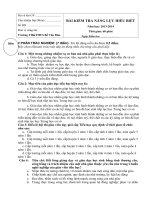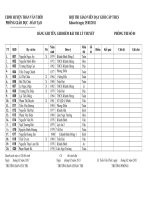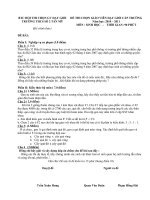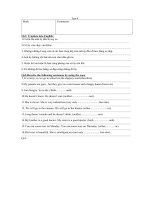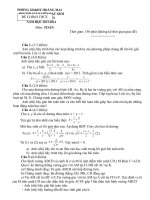De mau kiem tra nang luc GV Anh 03
Bạn đang xem bản rút gọn của tài liệu. Xem và tải ngay bản đầy đủ của tài liệu tại đây (106.26 KB, 8 trang )
<span class='text_page_counter'>(1)</span><div class='page_container' data-page=1>
<b>CFL ENGLISH PROFICIENCY TEST</b>
Subject: Use of English & Reading Place:
Date: Time: 80’
Full name: ………. Reg. No.: ………
<b>USE OF ENGLISH</b>
40 questions - 25 minutes
<i><b>Choose the best answer to complete each sentence</b></i><b>.</b>
<i>1. The shop opposite my house sells a variety of _____</i>
A. objects B. purchases C. goods D. productions
<i>2. A (n) …………. is a person who designs buildings.</i>
A. engineer B. artist C. architect D. plumber
<i>3. A shop where milk, cream, cheese, etc. are sold is called a _____ .</i>
A. daily B. dairy C. diary D. grocery
<i>4. I speak English __________than my sister.</i>
A. gooder B. better C. more good D. more well
<i>5. How long does it _____ you to get to school?</i>
A. get B. make C. take D. carry
<i>6. I go to school everyday _____ Sunday.</i>
A. except B. on C. next D. last
<i>7. I often go abroad _____ business.</i>
A. for B. on C. in D. through
<i>8. I’m very busy _____ the moment.</i>
A. in B. of C. for D. at
<i>9. _______ the wet weather, the football match went ahead.</i>
A. Although B. However C. Owing to D. Despite
<i>10. Remember _____ my best regards to her when you write.</i>
A. sending B. send C. sent D. to send
<i>11. Let me _____ for the meal. You paid last time.</i>
A. pay B. to pay C. paying D. paid
<i>12. _____ hello to everyone for me!</i>
A. tell B. talk C. say D. speak
<i>13. She's accustomed ________ living in comfort. </i>
(A) with (B) to (C) at (D) for
<i>14. Would you like _____ out with me tonight?</i>
A. to go B. going C. go D. went
<i>15. How _____ since we _____ school?</i>
A. are you/ left B. have you been/ have left
</div>
<span class='text_page_counter'>(2)</span><div class='page_container' data-page=2>
<i>16. When I got to the office, I _____ that I had forgotten to lock the door.</i>
A. realized B. had realized C. realize D. have realized
<i>17. _____ to the radio when you get up everyday?</i>
A. Do you listen B. Are you listening
C. Was you listening D. Did you listen
<i>18. They_____ to the theatre twice so far this month.</i>
A. are going B. go C. went D. have been
<i>19. He always _____ me .</i>
A. avoids to meet B. avoids meeting
C. avoiding to meet D. to avoid meeting
<i>20. Two pictures _________ from the National museum last night.</i>
A. was stolen B. stole C. were stole D. were stolen
<i>21. If I _____taller, I would _______a job in the police.</i>
A. were/got B. was/getting C. were/get D. was/got
<i>22. I’ll never forget _____ him for the first time .</i>
A. meet B. meeting C. to meeting D. to meet
<i>23. Tim _____ go fishing with his friends when he was young.</i>
A. used to B. is used to C. was used to D. has used to
<i>24. ______ Coca cola _______by Louis Lassen?</i>
A. were/invented B. was/invented
C. are/invent D. is/ invented
<i>25. If you keep_____ that dog won't hurt you.</i>
A. walking slowly B. slowly a walk
C. slow walk D. to walking slow
<i>26. I failed my exam. I worked hard for it. I’m so _____</i>
A. disappoint B. disappointing C. disappointingly D.
disappointed
<i>27. A man from a travel agency helped us ...a nice house.</i>
A. choose B. choosing C. to choosing D. chose
<i>28. The old man is _____ of walking 100 meters by himself.</i>
A. inexperienced B. incapable C. unable D.
immature
<i>29. _____ people have a perfect place from their childhood that brings back </i>
<i>lovely feelings.</i>
A. Most of B. Most C. Most the D. Most
many
<i>30. The more effort you put into your work, ______ .</i>
A. the better results are B. the results are better
C. the better are the results D. the better the results are
<i>31. She made me _____ for the petrol, but she allowed me _____ her car all day.</i>
A. pay/ use B. to pay/ to use C. pay/ to use D. pay/ using
<i>32. His hair is very short. He _____ a haircut.</i>
</div>
<span class='text_page_counter'>(3)</span><div class='page_container' data-page=3>
<i>33. To my _____ , John is very good at Vietnamese.</i>
A. amazing B. amazed C. amaze D. amazement
<i>34. It’s time we _____ home.</i>
A. go B. went C. gone D. going
<i>35<b>. </b>People say that prevention is better than cure.</i>
<i>In the passive voice</i>:
A. That prevention is said is better than cure
B. Prevention is better that cure is said by people
C. It was said that prevention is better than cure
D. Prevention is said to be better than cure.
<i>36<b>. </b>He had to explain the lesson very clearly ……….</i>
A. in order that his students can understand
B. so that his students to understand it
C. in order to his students to understand it
D. for his students in order to understand it
<i><b>Choose the letter A, B, C or D to indicate the sentence that is closest in </b></i>
<i><b>meaning to each of the following questions</b></i>
<i>37. Everyday I spend 30 minutes watering the garden.</i>
A. Everyday it takes me 30 minutes water the garden.
B. Everyday it took me 30 minutes to water the garden.
C. Everyday it takes me 30 minutes to water the garden.
D. Everyday it takes me 30 minutes watering the garden.
38. <i> You can eat as much as you like for £5 at the new lunch-bar.</i>
A. There is limit as much as you can eat at the new lunch-bar.
B. There is not limit how much can you eat at the new lunch-bar.
C. There is limit on how much you can eat at the new lunch-bar.
D. There is no limit on how much you can eat at the new lunch-bar.
39. Both Peter and Mary enjoy scientific expedition.
A. It is not Peter, but Mary, that enjoys scientific expedition.
B. Peter enjoys scientific expedition. Therefore, does Mary.
C. However Peter enjoys scientific expedition and Mary does.
D. Peter enjoys scientific expedition, and so does Mary.
<i>40. We have to delay our plan due to lack of time . </i>
A We have to cancel our plan due to lack of time.
B Our plan has to be cancelled because we don’t have enough time.
C Our plan has to be postponed because we don’t have time.
</div>
<span class='text_page_counter'>(4)</span><div class='page_container' data-page=4>
<b>READING COMPREHENSION</b>
50 questions - 55 minutes
<b>I. </b><i><b>Choose the word or phrase (A, B, C, or D) that best fits the blank space</b></i>
<i><b>in the following passage.</b></i>
Many people buy suitcases to carry ________ (1) when they go abroad
________ (2) and never take the trouble to find out whether they will be ________
(3) to survive the journey. ________ (4) case you buy -- and obviously ________ (5)
you pay for it, the better it is likely to be -- you should be careful ________ (6) too
much into it. A lot of passengers ________ (7) and then the locks break. Some
people think manufacturers should say how much ________ (8). But the
manufacturers say it depends ________ (9) the quality of the case. a cheap case,
________ (10) has been badly made, will obviously not last as long as an
expensive one.
1. A. his luggages B. his luggage C. their luggages D. their
luggage
2. A. in holiday B. on holiday C. in holidays D. on
holidays
3. A. so strong B. enough strong C. strong enough D. too strong
4. A. However B. Wherever C. Whatever D. Which
5. A. the more B. the most C. how much D. how many
6. A. for not packing B. to not pack C. not to pack D. in order not
to pack
7. A. do so B. do such C. make so D. make such
8. A. can carry the case B. the case can carry
C. can bear the case D. the case can bear
9. A. for B. with C. in D. on
10. A. what B. which C. it D. when
<b>II. </b><i><b>Choose the word or phrase (A, B, C, or D) that best fits the blank </b></i>
<i><b>space in the following passage.</b></i>
I have a brother who is (11) ______ me. We (12) ______. Yesterday was an
important day (13) ______ friends. In the morning (14) ________ of us had a big
exam at the technical college and then (15) ______ there was a big meeting at
the youth club at 9 o'clock. (That's where we usually go when we want to (16)
______ ourselves.) A rich woman had given us some money and yesterday we (17)
______ decide what to do (18) ______. Many people wanted to buy something new
for our club, but my brother and I wanted to give the money to another club that
has (19) ______. In the end, we decided to give half to the poor club and (20)
______ half for ourselves.
11. A. so old as B. so old that C. the same age D. the same age
as
</div>
<span class='text_page_counter'>(5)</span><div class='page_container' data-page=5>
13. A. to us and our B. for us and our C. to us and ours D. for us
and ours
14. A. most B. much C. more D. few
15. A. last night B. the last night C. last evening D. the last
evening
16. A. enjoy B. meet C. like D. divert
17. A. had to B. must C. should D. would
18. A. with it B. with them C. for it D.
for them
19. A. something B. anything C. nothing D. everything
20. A. keep another B. keep the other C. hold anotherD. hold the
other
<b>III. </b><i><b>Choose the word or phrase (A, B, C, or D) that best fits the blank </b></i>
<i><b>space in the following passage.</b></i>
Many of the things we do (21_____ on receiving information from other
people. Catching a train, making a phone call and going to the cinema all
involve information (22) _____ stored, processed and communicated. In the past,
this information had to be kept on paper (23_____, for example, books,
newspapers and timetables. Now more and more information is put (24) _____
computers.
Computers play a role in our everyday lives, sometimes without us even
realising it. (25) _____ the use of computers in both shops and offices. Big shops
have to deal with very large (26) _____ of information. They have to make sure
that there are enough goods on the shelves for customers to buy, they need to
be able to reorder before (27) _____ run out. A lot of office work in the past
involved information on paper. Once it had been dealt with by people, the paper
was (28) _____ for future reference. This way of working was never (29) _____
easy or fast. A computer system is much more (30) _____.
21. A. to depend B. depending C. depended D. depend
22. A. that has B. has C. is D. that is
23. A. in the case of B. in the form of C. in preparation for D.
in search of
24. A. on B. in C. by D. with
25. A. To be considered B. To consider C. Consider D. Be
considered
26. A. amount B. number C. numbers D. amounts
27. A. stocks B. items C. purchases D. cargoes
28. A. thrown away B. torn off C. put aside D.
recycled
29. A. particularised B. particular C. particularly D.
particularity
30. A. effective B. skillful C. capable D. formal
<b>IV. </b><i><b>Read the passage and choose the best answer.</b></i>
</div>
<span class='text_page_counter'>(6)</span><div class='page_container' data-page=6>
all of our present-day pets, livestock, and food plants were taken from the wild
and developed into the forms we know today.
As centuries passed and human cultures evolved and <i>blossomed</i>, humans
began to organise their knowledge of nature into the broad field of natural
history. One aspect of early natural history concerned the use of plants for drugs
and medicine. The early herbalists sometimes overworked their imaginations <i>in</i>
<i>this respect</i>. For example, it was widely believed that a plant or part of a plant
that resembles an internal organ would cure ailments of that organ. Thus, an
<i>extract </i> made from a heart-shaped leaf might be prescribed for a person
suffering from heart problems. Nevertheless, the overall contributions of these
early observers provided the <i>rudiments </i>of our present knowledge of drugs and
their uses.
31. What does this passage mainly discuss?
A. Cures from plants. B. The beginning of natural history.
C. Prehistoric man. D. Early plants and animals.
32. Domestication of plants and animals probably occurred because of _____
A. need for more readily available food
B. lack of wild animals and plants
C. early mans power as a hunter
D. the desire of prehistoric man to be nomadic
33. The word <i>“<b>this</b>” </i>refers to _____
A. providing food for man
B. man’s domestication of plants and animals
C. man’s ability to live on a small plot of land
D. the earliest condition of prehistoric man
34. The word <i>“<b>blossomed</b>” </i>is closest in meaning to _____
A. produced flowers B. changed C. learned D. flourished
35. An herbalist is which of the following?
A. A dreamer. B. An early historian.
C. Someone who uses plants in medicine. D. A farmer.
36. The phrase <i>“<b>in this respect</b>” </i>refers to _____
A. the development of human culture
B. the development of the field of natural history
C. the use of plants for drugs and medicine
D. the origin of knowledge of nature
37. The word <i>“<b>extract</b>” </i>is closest in meaning to _____
A. design B. substance C. flavour D. ailment
38. Which of the following can be inferred from the passage?
A. The shape of a plant is indicative of its ability to cure ailments of a similarly
shaped organ.
B. Early herbalists were unimaginative.
C. The work of early herbalists has nothing to do with present day medicine.
D. There is little relation between a cure for illness and the physical shape of a
plant.
39. The word <i>“rudiments” </i>is closest in meaning to _____
A. beginnings B. history C. requirements D. proofs
40. The passage would most likely lead to a more specific discussion in the field
of_____
A. zoology B. biology C. anatomy D.
</div>
<span class='text_page_counter'>(7)</span><div class='page_container' data-page=7>
<b>V.</b> Read the passage and choose the best answer.
Today's cars are smaller, safer, cleaner, and more economical than their
predecessors, but the car of the future will be far more pollution-free than those
on the road today. Several new types of automobile engines have already been
developed that run on alternative sources of power, such as electricity,
compressed natural gas, methanol, steam, hydrogen, and propane. Electricity,
however, is the only zero- emission option presently available.
Although electric vehicles will not be truly practical until a powerful,
<i>compact</i> battery or other dependable source of current is available,
transportation experts foresee a new assortment of electric vehicles entering
every life: shorter-range commuter electric cars, three-wheeled neighborhood
cars, electric delivery vans , bikes, and trolleys.
As automakers work to develop practical electrical vehicles, urban planners
and utility engineers are focusing on infrastructure system to support and make
the best use of the new cars. Public <i>charging</i> facilities will need to be as
common as today's gas stations. Public parking spots on the street or in
commercial lots will need to be equipped with devices that allow drivers to
charge their batteries while they stop, dine or attend a concert. To encourage
the use of electric vehicles, the most convenient parking in transportation
centers might be reserved for electric cars.
Planners <i>foresee</i> electric shuttle buses, trains, buses, and neighborhood
vehicles all meeting at transit centers that would have facilities for charging and
renting. Commuters will be able to rent a variety of electric cars to suit their
needs light trucks, one-person three wheelers, small cars, or electric/gasoline
<i>hybrid</i> cars for longer trips , which will no doubt take place on automated
freeways capable of handling five times the number of vehicles that can be
carried by a freeway today .
<i>41. The following electrical vehicles are all mentioned in the passage </i>EXCEPT
<i>______ .</i>
A. vans B. trains C. planes D. trolleys
<i>42. The author's purpose in the passage is to ______ .</i>
A. criticize conventional vehicles.
B. support the invention of electric cars.
C. narrate a story about alternative energy vehicles.
D. describe possibilities for transportation in the future.
<i>43. The passage would most likely be followed by details about _______ .</i>
A. automated freeways B. pollution restrictions in the
future.
C. the neighborhood of the future. D. electric shuttle buses.
<i>44. The word "<b>compact</b>" in the second paragraph is closest meaning to ______ .</i>
A. long-range. B. inexpensive. C. concentrated. D. squared.
<i>45. In the second paragraph the author implies that ______ .</i>
A. a dependable source of electric energy will eventually be developed.
B. everyday life will stay much the same in the future.
C. a single electric vehicle will eventually replace several modes of
transportation.
D. electric vehicles are not practical for the future.
</div>
<span class='text_page_counter'>(8)</span><div class='page_container' data-page=8>
A. more convenient than they are today. B. equipped with charging devices.
C. much larger than they are today. D. as common as today's gas stations.
<i>47. The word "<b>charging</b>" in this passage refers to</i>
A. electricity. B. credit cards. C. aggression. D. lightning.
<i>48. The word "<b>foresee</b>" in this passage could be best replaced with ____ .</i>
A. count on. B. invent C. imagine D. rely on
<i>49. The word "<b>commuter</b>" refers to ______ .</i>
A. daily travelers. B. visitors. C. cab drivers. D. shoppers.
<i>50. The word "<b>hybrid</b>" is closest meaning to _______ .</i>
A. combination. B. hazardous. C. futuristic D. automated.
</div>
<!--links-->
